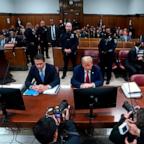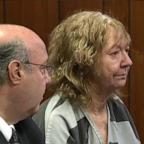Heat causing major meltdowns
— -- It wasn't until 8 p.m. local time that temperatures finally dipped below 100 degrees. Needless to say, the scorching heat caused a few meltdowns on Day 2 of the Australian Open.
"I think it's inhumane," said Canada's Frank Dancevic, who collapsed during his 6-7 (12), 3-6, 4-6 loss against Benoit Paire. "I don't think it's fair to anybody, to the players, to the fans, to the sport, when you see players pulling out of matches, passing out. I've played five-set matches all my life, and being out there for a set and a half and passing out with heatstroke, it's not normal.
"Having players with so many problems and complaining to the tournament that it's too hot to play, until somebody dies, they're just keep going on with it and putting matches on in this heat. I personally don't think it's fair, and I know a lot of players don't think it's fair."
The top temperature reached 108.5 degrees Tuesday.
In a statement released by the Australian Open, he said, "The majority of matches today were completed without any court calls from the medical team. Of course, there were a few players who experienced heat related illness or discomfort, but none required significant medical intervention after they had completed their match.
"Most of the matches today didn't go for much longer than a couple of hours and generally the playing group coped extremely well."
Wood also called tennis a relatively low-risk sport compared with others. Not everyone agreed with that assessment, including Martina Navratilova, who called Wood "completely clueless" on her Twitter account.
Asked whether three or four days straight of these temps would have a cumulative effect on athletes (temperatures are predicted to be above 106 degrees until Saturday), Wood said, "From a medical perspective, not really. … If the weather stays as it is and we don't get rain delays, they obviously only play every 48 hours. So they have got plenty of time to recover between singles matches. If anything, depending where the players have been before they arrive here there is an acclimatization that is beneficial to the players.
"Certainly in the next four days, they will have plenty of chance to acclimatize. The body does put in measures that assist in coping with the heat. So if anything, the players will acclimatize with playing in the heat. They might actually get better, particularly with the 48 hours rest between matches."
Well then.
The heat didn't affect everyone, though. Sloane Stephens, a first-round winner, said her smartphone helped her prepare for the latest dog days Down Under.
"I just expected it would be hot," she said. "But, I mean, I kept looking at my phone. Mine is in Fahrenheit. I'm like, 108 Fahrenheit. Why is that happening? Then I kind of like Googled 45 centigrade, like, just to see what's happening.
"I think the heat was more in my mind than anything. When I got there, it wasn't that bad for me. Obviously, I played later, so it was OK."
In the first two days, eight men and one woman retired. Interestingly, none cited the hot spell as a reason.
Andy Murray said that, despite the convoluted heat rules, you just play if you're told to play.
"Yeah, it's definitely something that you maybe have to look at a little bit," the two-time Grand Slam champion said. "As much as it's easy to say the conditions are safe -- you know, a few people said there's doctors and stuff saying it's fine -- it only takes one bad thing to happen. And it looks terrible for the whole sport when people are collapsing, ball kids are collapsing, people in the stands are collapsing. That's obviously not great.
"And I know, when I went out to hit before the match, the conditions like at 2:30, 3:00 were very, very, very tough conditions. Anyone's going to struggle in that heat."
What others are saying
Juan Martin del Potro: "Was terrible for play. I mean, it was for both player, but is tough to play long rallies, to manage the weather conditions. And it's tough to play in these kind of conditions.
"I mean, you are thinking about a lot more things than the tennis match. You are trying to drink a lot and always thinking about your body, your [physique], and not about the game.
"I know tomorrow and after tomorrow it's going to be worst, so I will try to be ready for the weather conditions, too."
Victoria Azarenka: "Just using ice, you know, hydrate. It's simple things, but you just have to be very disciplined about it. Ball kids make a great job just bringing the ice towels right there."
Roger Federer: "Yeah, I thought it was very dry, just hot, you know, stinging sort of sun.
"I guess also it depends on who you play; if you're playing a big server, clearly faster conditions. If you're getting into rallies, I guess you'll feel the heat a bit more.
"Depending on where you come from, it has a bigger effect on you, this type of heat, than maybe humid heat. So, it's very personal, and it can become just a very mental thing, you know, and you just can't accept that it's hot.
"Just deal with it because it's the same for both. That's basically it."
Jo-Wilfried Tsonga: "Yeah, I think it's maybe the hottest condition I played in. I remember a match I played against [Kei] Nishikori a few years ago, which was also tough. We knew before it's gonna be difficult today, and it was, so it's good to finish that and look for the next round."
Going the distance again
Speaking of peanut butter, things sure got sticky with temperatures soaring well into triple digits for his match. Hewitt, who has a long history of marathons in the season's opening Grand Slam event, fought the heat for 4 hours, 18 minutes before finally succumbing to Andreas Seppi 7-6 (4), 6-3, 5-7, 5-7, 7-5 in the opening round.
"Yeah, it was obviously hot," Hewitt told reporters afterward. "As the match went on, we got a little bit of cloud cover. And with the roof, you know, just a bit of shade I guess across the court, which is a bit more pleasant to play in."
Hewitt entered this year's event fresh off a title at the Brisbane International, where he beat 17-time Slam champion Federer in the final. He couldn't have asked for more confidence coming in, and, given he had fallen in the first round last year, this one had to sting.
"Every Grand Slam loss is tough," Hewitt said. "There's no easy ones. You know, obviously, if you come close to winning, even though it's a first-round match, it's still frustrating."
Hewitt was now lost his opener in Australia eight times in 18 trips. But he is no stranger to the kind of marathons he played Tuesday.
Three years ago, he went 4 hours, 48 minutes with David Nalbandian in the first round and lost 9-7 in the fifth. In 2009, Fernando Gonzalez upended Hewitt in five sets, but perhaps the most famous off all his epics was his 2008 third-round battle with Marcos Baghdatis, a match that didn't begin until close to midnight and finished at 4:34 a.m. local time, the latest finish in Grand Slam history.
And, in 2005, Hewitt beat Rafael Nadal and Nalbandian in consecutive five-setters, then Andy Roddick in four, before running into Marat Safin in the final.
At this point, he has to be sick off all this OT. After all, it was Hewitt's 53rd career five-set match.
"It would be nice to, yeah, get through a bit more [comfortable] and get through," Hewitt said. "With that said, I didn't have a lot of choice after being down two sets to love today. That was the only way out of it. I had to try to keep fighting, find a way."
Speaking of marathons
Gilles Simon entered the Australian Open on crutches. He left his first-round match at the Australian Open by winning the fifth set 16-14 over Daniel Brands.
Clearly, the 18th-seeded Frenchman recovered well. The match lasted 4 hours, 32 minutes. Oh, and if you haven't already figured it out, he did this while baking in the extreme heat for the duration.
Just last week, Simon was trailing compatriot Richard Gasquet 7-6 (3) 1-0 at the AAMI Classic when he appeared to roll his right ankle as he ran toward the net. He retired from that match with his foot wrapped in ice.
Things won't get any easier for Simon, who will next face big-serving Marin Cilic.




